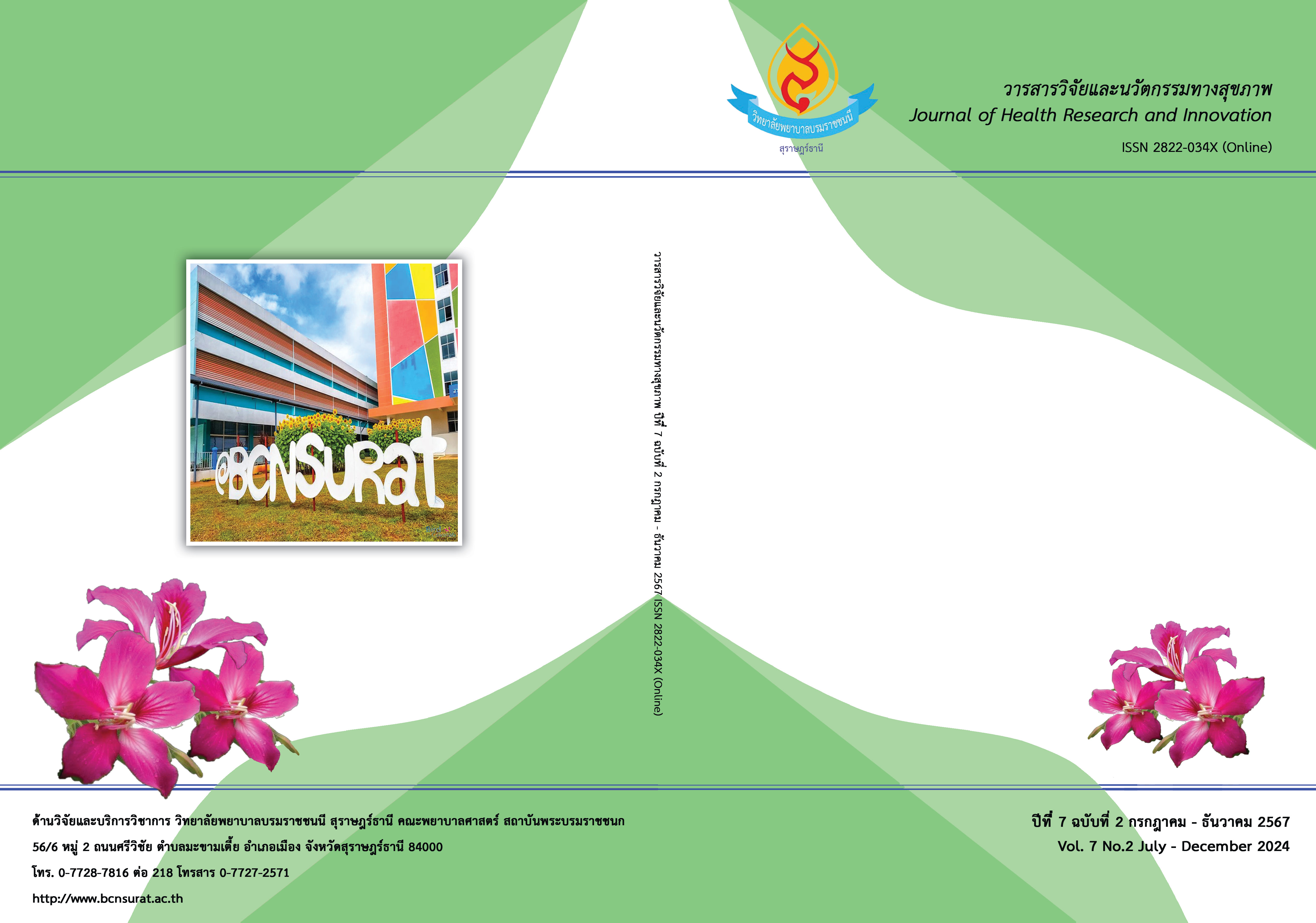ผลของโปรแกรมการฟื้นฟูสภาพจิตใจต่อความรู้สึกมีคุณค่าในตนเอง ของสตรีที่ถูกกระทำความรุนแรง
คำสำคัญ:
โปรแกรมการฟื้นฟูสภาพจิตใจ, ความรู้สึกมีคุณค่าในตนเอง, สตรีที่ถูกกระทำความรุนแรงบทคัดย่อ
การวิจัยกึ่งทดลองนี้มีวัตถุประสงค์เพื่อศึกษาผลของโปรแกรมการฟื้นฟูสภาพจิตใจ ต่อความรู้สึก มีคุณค่าในตนเองของสตรีที่ถูกกระทำความรุนแรง กลุ่มตัวอย่างคือสตรีที่ถูกกระทำความรุนแรง อายุ 20-59 ปี จำนวน 60 คน คัดเลือกแบบเฉพาะเจาะจง แบ่งเป็นกลุ่มทดลอง 30 คน ที่ได้รับโปรแกรมการฟื้นฟูสภาพจิตใจ และกลุ่มควบคุม 30 คน ได้รับการดูแลตามปกติ เครื่องมือที่ใช้ในการวิจัย ได้แก่ แบบสอบถามข้อมูลทั่วไป แบบประเมินความรู้สึกมีคุณค่าในตนเองของโรเซนเบิร์ก และโปรแกรมการฟื้นฟูสภาพจิตใจ จัดกิจกรรมเป็นรายกลุ่ม 5 กลุ่ม กลุ่มละ 5-7 คน สัปดาห์ละ 1 ครั้ง ครั้งละประมาณ 60-90 นาที จำนวน 4 สัปดาห์ โปรแกรมและเครื่องมือวิจัยผ่านการตรวจสอบโดยผู้ทรงคุณวุฒิจำนวน 3 ท่าน ได้ค่าความตรงของเนื้อหาเท่ากับ 1.00 ทดสอบความเที่ยงของเครื่องมือ แบบประเมินความรู้สึกมีคุณค่าในตนเองด้วยการหาค่าสัมประสิทธิ์แอลฟาของครอนบาค เท่ากับ .81 และทดลองใช้กับสตรีที่ถูกกระทำความรุนแรงจำนวน 5 ราย วิเคราะห์ข้อมูลโดยหาค่าความถี่ ร้อยละ ค่าเฉลี่ย ส่วนเบี่ยงเบน มาตรฐาน และทดสอบความแตกต่างระหว่างกลุ่มโดยการทดสอบค่าที เปรียบเทียบผลการศึกษาของกลุ่มทดลองแบบก่อนและหลังการทดลองโดยใช้สถิติการทดสอบค่าทีแบบสัมพันธ์ และเปรียบเทียบหลังการทดลองระหว่างกลุ่มควบคุมและกลุ่มทดลอง โดยใช้สถิติทีอิสระ
ผลการวิจัยพบว่า กลุ่มทดลองหลังได้รับโปรแกรมการฟื้นฟูสภาพจิตใจ มีค่าคะแนนเฉลี่ยความรู้สึกมีคุณค่าในตนเองสูงกว่าก่อนทดลอง อย่างมีนัยสำคัญทางสถิติ (t=-17.69, p< .001) และหลังได้รับโปรแกรมการฟื้นฟูสภาพจิตใจ กลุ่มทดลองมีค่าคะแนนเฉลี่ยความรู้สึกมีคุณค่าในตนเองสูงกว่ากลุ่มควบคุมอย่างมีนัยสำคัญทางสถิติ (t=10.84, p< .001)
ผลการวิจัยแสดงถึงโปรแกรมการฟื้นฟูสภาพจิตใจสามารถส่งเสริมให้สตรีที่ถูกกระทำความรุนแรงเกิดการพัฒนาความสามารถจัดการกับภาวะวิกฤติที่เกิดขึ้นในชีวิต และเผชิญกับปัญหาได้อย่างมีประสิทธิภาพ สามารถกลับมาใช้ชีวิตได้อย่างรวดเร็วภายหลังเผชิญเหตุการณ์วิกฤติ ทำให้ความรู้สึกมีคุณค่าในตนเองของสตรีที่ถูกกระทำความรุนแรงเพิ่มขึ้นจริง ดังนั้นพยาบาลจิตเวชสามารถนำโปรแกรมไปประยุกต์ใช้เพื่อเพิ่มความรู้สึกมีคุณค่าในตนเองของสตรีที่ถูกกระทำความรุนแรงได้
เอกสารอ้างอิง
Amornrat, S. (2011). Nursing Care of Women who have Experienced Intimate Partner Violence. Journal of Nurses’ Association of Thailand, North-Eastern Division, 29(2), 5-13
Anderberg, D. (2016). Unemployment and domestic violence: Theory and evidence. The Economic Journal, 126(597), 1947-1979.
Association for the Promotion of the Status of Women. (2021). Annual report 2022. Bangkok: Association for the Promotion of the Status of Women. (in Thai)
Audjara, T. (2017). The Effects of Therapeutic Relationship Program on Self Esteem Among Girls in Exposure to Violence in the Central Region Reception Home for Girls, A Thesis Submitted in Partial Fulfillment of the Requirements for the Degree of Master of Nursing Science in Psychiatric Nursing and Mental Health Faculty of Nursing, Thammasat University. (in Thai)
Barker, P. (2001). The Tidal Model: developing and empowering, person-centered approach to recovery within psychiatric and mental health nursing. Journal of Psychiatric and Mental Health Nursing, 8, 233-240.https://doi.org/10.1046/j.1365-2850.2001.00391.x
Barker, P. (2005). The Tidal model: A guide for mental health professionals. New York: Taylor & Francis book.
Bossakornrata, H., Trakul, C., & Pisamai, J. (2018). Management Process For The Protection Of The Rights And Prevention Of Violence Against Children And Women In Bangkok And Vicinity. Journal of MCU Social Science Review, 7(3), 193-205.
Cohen, J. (1988). Statistical power analysis for the behavioral sciences. Hillsdale, New Jersey: Lawrence Erlbaum Associates.
Department of Woman’s Affairs and Family Development. (2018). Annual report statistics of Department of Woman’s Affairs and Family Development 2019. Ministry of Social Development and Human Security, 1(2), 18. (in Thai)
Dominguez, R.Z., Nelke, C. F., & Perry, B. D. (2001). Sexual abuse of children its psychosomatic consequences. Barring, MA: Berkshire Publishing Group Great.
Emel, T., & Mahire, C. (2020). The Effect of Tidal Model-Based Psychiatric Nursing Approach on the Resilience of Women Survivors of Violence. Issues in Mental Health Nursing. 3-4. https://doi.org/10.1080/01612840.2019.1672222
Kasara, S. (2014). Factors Predicting Sexual Assertiveness in Young Adult Women. Journal of Public Health Nursing, 28(2), 65–80.
Kingkarn, K., Wannee, D., & Chintana, W. (2016). Effect of an Empowerment Intervention on Abused Pregnant Women: A Randomized Controlled Trial. Nursing Journal of the Ministry of Public Health, 26(1), 27-39.
Ministry of Social Development and Human Security. (2018). Statistics Hotline1300. Retrieved October 20, from http://moc.m-society.go.th/?wpfb_dl=4372
Naruemon, M., Monthira, C., & Patcharapor, S. (2018). Enhancement of Resilience a Adolescents to Family Violence Through Group Counseling. Veridian E-Journal, Silpakorn University, 11(3), 787-880.
Pisan, M. (2018). The Effect of Mental Health Rehabilitation Program on Resilience of Orphans from the Unrest Situation in Southern Thailand. A Thesis Submitted in Partial Fulfillment of the Requirements for the Degree of Master of Nursing Science in Psychiatric and Mental Health Nursing, Prince of Songkhla University. (in Thai)
Rathavich, A., & Paphatsorn, W. (2020). The Resolution Of Domestic Violence In Thailand. Journal of social science and buddhistic anthropologyt, 5(4), 321-355.
Rosenberg, M. (1979). Conceiving the self. New York: Basic Books.
Savasan, A., & Cam, O. (2017). The Effect of the Psychiatric Nursing Approach Based on the Tidal Model on Coping and Self-esteem in People with Alcohol Dependency: A Randomized Trial. Archives of psychiatric nursing, 31, 274-281. https://doi.org/10.1016/j.apnu.2017.01.002
Somporn, R., & Ingkata, K. (2017). Feminist therapy. Journal of Nursing Science & Health, 40(2), 107-118.
Sukanya, S. (2018). The Problem of Family Violence in Thai Society. Journal of MCU Peace Studies Special Issue, 6, 600-609.
Susanha, Y, & Rangsiya, N. (2015). Sexual Risk Behaviors and Family Violence among Akha Women. Nursing Journal., 42(2), 146-155.
Tatsanee, K., Yunee P., & Maneerat P. (2010). Experience in Sexual Abuse Among Female Adolescents. Journal of Nursing and Education, 3(2), 57-72.
Umamon P. (2015). Domestic violence and Psychiatrics effects. Retrieved October 18, fromhttp://www.familynetwork.or.th/node/15717
Vienna. (2022). Global Study On Homicide Gender-related killing of women and girls. UNODC Research, 3-62.
Wallapha, I., Papasorn, R., Ubonrat, S., & Pattama, W. (2015). The Effect of Activity Therapy on Stress in Women Abused. Journal of The Police Nurse, 7(1), 143-152.
Warisara, C., Pennapha, K., & Pracha, I. (2020). Enhancing emotional adjustment of family abused women through individual counseling on rational emotive behavior theory. Journal of Educational Measurement, 37(101), 127-135. (in Thai)
ดาวน์โหลด
เผยแพร่แล้ว
รูปแบบการอ้างอิง
ฉบับ
ประเภทบทความ
สัญญาอนุญาต
ลิขสิทธิ์ (c) 2024 วิทยาลัยพยาบาลบรมราชชนนี สุราษฎร์ธานี

อนุญาตภายใต้เงื่อนไข Creative Commons Attribution-NonCommercial-NoDerivatives 4.0 International License.
บทความที่ได้รับการตีพิมพ์เป็นลิขสิทธิ์ของวารสารวิทยาลัยพยาบาลบรมราชชนนี สุราษฎร์ธานี
ข้อความที่ปรากฏในบทความแต่ละเรื่องในวารสารวิชาการนี้เป็นความคิดเห็นส่วนตัวของผู้เขียนแต่ละท่านไม่เกี่ยวข้องกับวิทยาลัยพยาบาลบรมราชชนนี สุราษฎร์ธานี และคณาจารย์ท่านอื่นๆในวิทยาลัยฯ แต่อย่างใด ความรับผิดชอบองค์ประกอบทั้งหมดของบทความแต่ละเรื่องเป็นของผู้เขียนแต่ละท่าน หากมีความผิดพลาดใดๆ ผู้เขียนแต่ละท่านจะรับผิดชอบบทความของตนเองแต่ผู้เดียว



